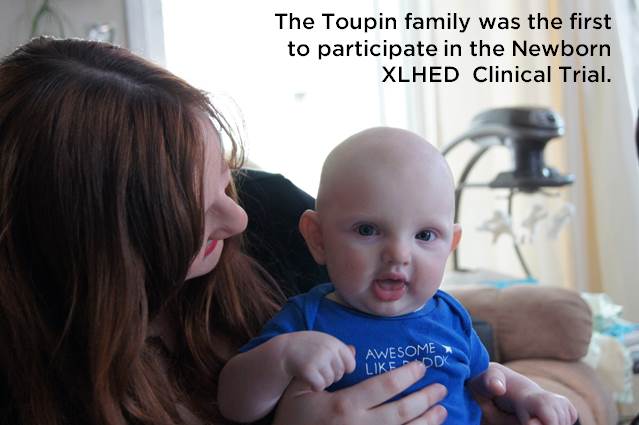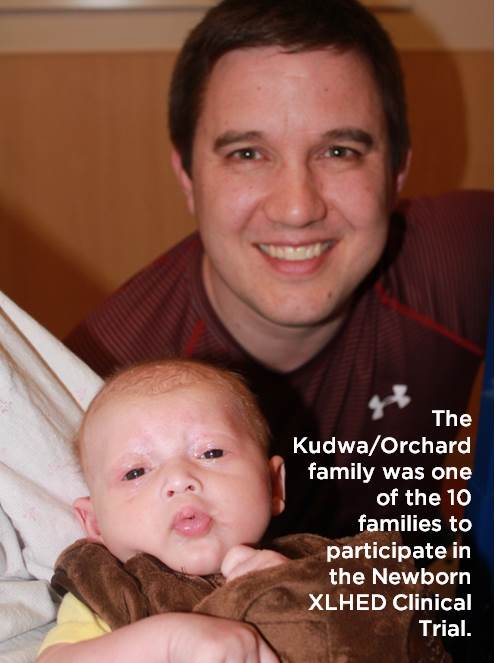I want to share with you, our families, donors and friends, the latest developments regarding the Newborn X-Linked Hypohidrotic Ectodermal Dysplasia (XLHED) Clinical Trial being conducted by Edimer Pharmaceuticals. It has now been two years and three months since the first baby boy affected by XLHED received EDI200, a recombinant protein to replace the one missing in people affected by the condition. Ten babies participated in the trial. Edimer has received and reviewed six-month data from all enrolled participants and data up to two years for the first participant who enrolled. They have provided us with their findings which I will share with you now.
Unfortunately, the news isn’t what we had hoped to hear. It is with a heavy heart that I tell you that the clinical trial did not achieve its expected outcomes. There were some modest signs of improvement in biologic activity, meaning the development and function of various body parts that XLHED affects. However, they didn’t see significant changes in sweat gland function and other early markers of biologic activity at this time.
Dose Earlier?
In the trial, all of the babies enrolled received their first treatment of EDI200 within their first weeks of life. Edimer and the research investigators involved hypothesize that the babies didn’t receive the protein early enough to have a significant impact. Edimer continues to have ongoing discussions with the investigators to find a way to explore earlier dosing. More information on this will be coming soon.
Dentition
According to Edimer, they are just getting to the time point when they can  evaluate dentition. Their review of the earliest participants is potentially more encouraging in terms of the number of teeth that develop. Edimer received an orphan drug grant to continue the extension study, which will allow them to see if EDI200 had any impact on longer term markers, including dentition. Once they have that data, Edimer plans to publish their findings and share with our XLHED community.
evaluate dentition. Their review of the earliest participants is potentially more encouraging in terms of the number of teeth that develop. Edimer received an orphan drug grant to continue the extension study, which will allow them to see if EDI200 had any impact on longer term markers, including dentition. Once they have that data, Edimer plans to publish their findings and share with our XLHED community.
A Doctor’s Perspective
Dr. J. Timothy Wright from our Scientific Advisory Council (SAC) said, “Clinical investigations of new therapies and treatment approaches are time-consuming and costly. Studies are designed to ensure safety. The clinical trials using a fusion protein to treat XLHED have followed this course with the first phase being conducted in adults and the second phase in infants. The initial results from the adult studies showed no evidence related to safety concerns.
“More recent results in the infants have shown that sweat gland and other ectodermal tissue derivatives that begin to form very early in utero were not improved using the dosages given. This is not altogether surprising as the dosages in the initial infants was lower than considered ideal to ensure safety and it was known that many of the ectodermally derived tissue components formed before birth and would likely not benefit from treatment after birth. The results on tooth formation, which continues after birth, are only now beginning to be evaluated,” Wright said.
Edimer
The company will continue to collect long-term data. But, they will not enroll any additional babies in the Newborn XLHED Clinical Trial nor will they begin any new outreach programs. They do not yet know what will happen with the Natural History Study they have been conducting in which many of you, our families, participated. This study was gathering better data on XLHED to help us understand and describe the syndrome. Edimer believes the study is important to helping our XLHED community and hope they can work with the research investigators, the NFED and other ectodermal dysplasias groups around the world to keep the study active. However, continuing the study will mean identifying and securing the necessary research funds.
XLHED Global GeneScreen
Edimer has disbanded this program and will no longer provide genetic testing for XLHED families.
Edimer Staff
Neil Kirby will continue to be Edimer’s CEO but with a reduced time commitment. Tessa Field and Ramsey Johnson are no longer with Edimer  but are available as consultants to them.
but are available as consultants to them.
I’m confident you are feeling the great disappointment that we are here at the Foundation. All of us had such incredible hope that EDI200 would provide a viable treatment for our families affected by XLHED. While that doesn’t appear to be the case, we remain hopeful that it will have a more significant impact on the long-term markers such as the teeth. Only time will tell.
While this is a huge letdown, it is the not the end for our commitment to XLHED research. We – the NFED and our families – began XLHED research in the late 1980s and advanced it to the point of this clinical trial. Yet, it is a definite setback. Unfortunately, in the world of research, especially novel research like the clinical trial, two steps forward and one step back is often the course until you achieve success.
Our work will and must continue. Having just received this news ourselves, we do not yet know what our exact next steps will be. Our SAC and Board of Directors will meet to discuss this development and consider our options. But, I can assure you, we are committed to XLHED research.
While the ultimate goal of the Newborn XLHED Clinical Trial was not met, numerous positive outcomes happened because of our partnership with Edimer Pharmaceuticals.
- Edimer funding led to the development of our Ectodermal Dysplasias International Registry.
- Numerous families received funding to help them attend an NFED Family Conference.
- Edimer has generated some interesting data around ectodysplasin biology and wound healing. They are exploring if they could potentially apply this to other genetic skin diseases. Considering the significant skin erosions our families with other forms of ectodermal dysplasia experience, we are hopeful these findings can possibly benefit them.
- Edimer funded our four Regional Family Conferences and Care Provider Symposia in 2015.
- Edimer helped build a stronger international coalition of leaders in the ectodermal dysplasias community.
- Edimer also provided funding to help the NFED rebrand our organization, build a new website and assist with funding for the Ectodermal Dysplasias Classification project.
We are truly grateful for all of Edimer’s financial and staff support. Having spoken with our friends at Edimer, we know they, too, are also very disappointed in the 6-month outcomes in this study.
I realize this announcement is long but I wanted to provide you with all of the pertinent information as we know it. I suspect that you may have questions. I invite you to contact me at 618-566-2020 or mary@nfed.org and I will try to answer them as best I can. The information I shared here is what we know at this time. As we continue to work with Edimer and discuss the future, we will keep you informed.
Our determination to find answers and our families’ unwavering commitment to assist the research progress for the last three decades has brought us great success. It is these qualities which will propel us to regroup, recharge and continue our quest to find better treatments, and ultimately a cure, for XLHED. We will not be deterred. But, we will need your help and support to work together and make it a reality.
Thank you for your dedication to research. We are here…Supporting you. Supporting each other.
[…] with XLHED were given ectodysplasin A within weeks of birth. Unfortunately, the clinical trial was ended in 2016, and deemed unsuccessful after seeing no significant improvement in the […]